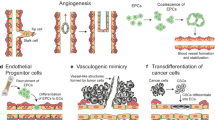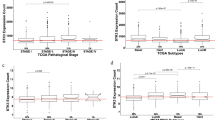Abstract
Angiogenesis is a prognostic indicator in primary breast cancer regulated by specific angiogenic factors and their receptors. Vascular endothelial growth factor-A (VEGF-A), so far considered the most important, acts through dimerization of the receptor VEGFR2/KDR within the receptor tyrosine kinase family of VEGF receptors. In order to study the interplay between VEGF-A and VEGFR2/KDR in breast cancer we evaluated their expression by immunohistochemistry in 102 breast cancers organized in a tumor tissue array system allowing semi-quantitative evaluation of cytoplasmatic staining intensity. In addition, VEGF-A165 was analyzed by an enzyme immuno assay (ELISA) in protein extracts prepared from frozen tissue from 98 of 102 tumors included in the array. Cytoplasmatic staining of VEGF of varying intensity was observed in all samples and correlated with the ELISA results of VEGF content (p = 0.007). Interestingly, VEGFR2/KDR expression correlated with VEGF expression using immunohistochemistry, indicating that VEGF and VEGFR2/KDR may be co-expressed in breast cancer. Furthermore, high levels of VEGF-A165 in the protein extracts was associated with impaired short time survival but not long term survival whereas immunohistochemically assessed VEGF and VEGFR2/KDR were not significantly associated with survival. In summary, immunohistochemically based analysis of VEGF using a tumor tissue array system seems to be a useful method for VEGF quantification in breast cancer here validated using an ELISA based method. The tumor tissue array system enables opportunities of simultaneous analysis of markers engaged in angiogenesis justifying further studies using larger series of tumors.
Similar content being viewed by others
References
Aamdal S, Bormer O, Jorgensen O, Host H, Eliassen G, Kaalhus O, Pihl A: Estrogen receptors and long-term prognosis in breast cancer. Cancer 53(11): 2525-2529, 1984
Adams J, Carder PJ, Downey S, Forbes MA, MacLennan K, Allgar V, Kaufman S, Hallam S, Bicknell R, Walker JJ, Cairnduff FF, Selby PJ, Perren TJ, Lansdown M, Banks RE: Vascular endothelial growth factor (VEGF) in breast cancer: comparison of plasma, serum, and tissue VEGF and microvessel density and effects of tamoxifen. Cancer Res 60(11): 2898-2905, 2000
Barleon B, Hauser S, Schollmann C, Weindel K, Marme D, Yayon A, Weich HA: Differential expression of the two VEGF receptors flt and KDR in placenta and vascular endothelial cells. J Cell Biochem 54(1): 56-66, 1994
Barleon B, Siemeister G, Martiny-Baron G, Weindel K, Herzog C, Marme D: Vascular endothelial growth factor upregulates its receptor fms-like tyrosine kinase 1 (FLT-1) and a soluble variant of FLT-1 in human vascular endothelial cells. Cancer Res 57(23): 5421-5425, 1997
Brown LF, Guidi AJ, Schnitt SJ, Van De Water L, Iruela-Arispe ML, Yeo TK, Tognazzi K, Dvorak HF: Vascular stroma formation in carcinoma in situ, invasive carcinoma, and metastatic carcinoma of the breast. Clin Cancer Res 5(5): 1041-1056, 1999
Callagy G, Dimitriadis E, Harmey J, Bouchier-Hayes D, Leader M, Kay E: Immunohistochemical measurement of tumor vascular endothelial growth factor in breast cancer. A more reliable predictor of tumor stage than microvessel density or serum vascular endothelial growth factor. Appl Immunohistochem Mol Morphol 8(2): 104-109, 2000
Camp RL, Charette LA, Rimm DL: Validation of tissue microarray technology in breast carcinoma. Lab Invest 80(12): 1943-1949, 2000
Costa SD, Lange S, Klinga K, Merkle E, Kaufmann M: Factors influencing the prognostic role of oestrogen and progesterone receptor levels in breast cancer-results of the analysis of 670 patients with 11 years of follow-up. Eur J Cancer 38(10): 1329-1334, 2002
de Jong JS, van Diest PJ, van der Valk P, Baak JP: Expression of growth factors, growth inhibiting factors, and their receptors in invasive breast cancer. I: An inventory in search of autocrine and paracrine loops. J Pathol 184(1): 44-52, 1998
Eppenberger U, Kueng W, Schlaeppi JM, Roesel JL, Benz C, Mueller H, Matter A, Zuber M, Luescher K, Litschgi M, Schmitt M, Foekens JA, Eppenberger-Castori S: Markers of tumor angiogenesis and proteolysis independently define highand low-risk subsets of node-negative breast cancer patients. J Clin Oncol 16(9): 3129-3136, 1998
Folkman J: What is the evidence that tumors are angiogenesis dependent? J Natl Cancer Inst 82(1): 4-6, 1990
Gasparini G, Weidner N, Bevilacqua P, Maluta S, Dalla Palma P, Barbareschi M, Boracchi P, Marubini E, Pozza F: Tumor microvessel density, p53 expression, tumor size, and peritumoral lymphatic invasion are relevant prognostic markers in node-negative breast carcinoma. J Clin Oncol 12(3): 441-443, 1994
Gasparini G, Toi M, Gion M, Verderio P, Dittadi R, Hanatani M, Matsubara I, Vinante O, Bonoldi E, Boracchi P, Gatti C, Suzuki H, Tominaga T: Prognostic significance of vascular endothelial growth factor protein in node-negative breast carcinoma. J Natl Cancer Inst 89(2): 139-147, 1997
Gasparini G, Toi M, Verderio P, Ranieri G, Dante S, Bonoldi E, Boracchi P, Fanelli M, Tominaga T: Prognostic significance of p53, angiogenesis, and other conventional features in operable breast cancer: subanalysis in node-positive and node-negative patients. Int J Oncol 12(5): 1117-1125, 1998
Gasparini G, Toi M, Miceli R, Vermeulen PB, Dittadi R, Biganzoli E, Morabito A, Fanelli M, Gatti C, Suzuki H, Tominaga T, Dirix LY, Giron M: Clinical relevance of vascular endothelial growth factor and thymidine phosphorylase in patients with node-positive breast cancer treated with either adjuvant chemotherapy or hormone therapy. Cancer J Sci Am 5(2): 101-111, 1999
Hahnel R, Woodings T, Vivian AB: Prognostic value of estrogen receptors in primary breast cancer. Cancer 44(2): 671-675, 1979
Hilsenbeck SG, Clark GM, McGuire WL: Why do so many prognostic factors fail to pan out? Breast Cancer Res Treat 22(3): 197-206, 1992
Huang K, Andersson C, Roomans GM, Ito N, Claesson-Welsh L: Signaling properties of VEGF receptor-1 and-2 homo-and heterodimers. Int J Biochem Cell Biol 33(4): 315-324, 2001
Kranz A, Mattfeldt T, Waltenberger J: Molecular mediators of tumor angiogenesis: enhanced expression and activation of vascular endothelial growth factor receptor KDR in primary breast cancer. Int J Cancer 84(3): 293-298, 1999
Landberg G, Ostlund H, Nielsen NH, Roos G, Emdin S, Burger AM, Seth A: Downregulation of the potential suppressor gene IGFBP-rP1 in human breast cancer is associated with inactivation of the retinoblastoma protein, cyclin E overexpression and increased proliferation in estrogen receptor negative tumors. Oncogene 20(27): 3497-3505, 2001
Linderholm B, Tavelin B, Grankvist K, Henriksson R: Vascular endothelial growth factor is of high prognostic value in node-negative breast carcinoma. J Clin Oncol 16(9): 3121-3128, 1998
Linderholm B, Tavelin B, Grankvist K, Henriksson R: Does vascular endothelial growth factor (VEGF) predict local relapse and survival in radiotherapy-treated node-negative breast cancer? Br J Cancer 81(4): 727-732, 1999
Linderholm B, Grankvist K, Wilking N, Johansson M, Tavelin B, Henriksson R: Correlation of vascular endothelial growth factor content with recurrences, survival, and first relapse site in primary node-positive breast carcinoma after adjuvant treatment. J Clin Oncol 18(7): 1423-1431, 2000
Manders P, Beex LV, Tjan-Heijnen VC, Geurts-Moespot J, Van Tienoven TH, Foekens JA, Sweep CG: The prognostic value of vascular endothelial growth factor in 574 nodenegative breast cancer patients who did not receive adjuvant systemic therapy. Br J Cancer 87(7): 772-778, 2002
Nielsen NH, Arnerlov C, Emdin SO, Landberg G: Cyclin E overexpression, a negative prognostic factor in breast cancer with strong correlation to oestrogen receptor status. Br J Cancer 74(6): 874-880, 1996
Straume O, Akslen LA: Expresson of vascular endothelial growth factor, its receptors (FLT-1, KDR) and TSP-1 related to microvessel density and patient outcome in vertical growth phase melanomas. Am J Pathol 159(1): 223-235, 2001
Toi M, Inada K, Suzuki H, Tominaga T: Tumor angiogenesis in breast cancer: its importance as a prognostic indicator and the association with vascular endothelial growth factor expression. Breast Cancer Res Treat 36(2): 193-204, 1995
Toi M, Inada K, Hoshina S, Suzuki H, Kondo S, Tominaga T: Vascular endothelial growth factor and platelet-derived endothelial cell growth factor are frequently coexpressed in highly vascularized human breast cancer. Clin Cancer Res 1(9): 961-964, 1995
Torhorst J, Bucher C, Kononen J, Haas P, Zuber M, Kochli OR, Mross F, Dietrich H, Mihatsch M, Kallioniomi OP, Sauter G: Tissue microarrays for rapid linking of molecular changes to clinical endpoints. Am J Pathol 159(6): 2249-2256, 2001
Weidner N, Semple J, Welch WR, Folkman J: Tumor angiogenesis and metastasis-correlation in invasive breast carcinoma. N Engl J Med 324(1): 1-8, 1991
Veikkola T, Alitalo K: VEGFs, receptors and angiogenesis. Semin Cancer Biol 9: 211-220, 1999
Author information
Authors and Affiliations
Rights and permissions
About this article
Cite this article
Rydén, L., Linderholm, B., Nielsen, N.H. et al. Tumor Specific VEGF-A and VEGFR2/KDR Protein are Co-expressed in Breast Cancer. Breast Cancer Res Treat 82, 147–154 (2003). https://doi.org/10.1023/B:BREA.0000004357.92232.cb
Issue Date:
DOI: https://doi.org/10.1023/B:BREA.0000004357.92232.cb




